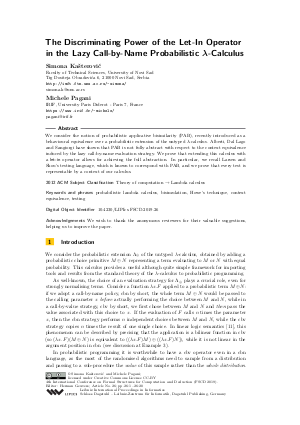@InProceedings{kasterovic_et_al:LIPIcs.FSCD.2019.26,
author = {Ka\v{s}terovi\'{c}, Simona and Pagani, Michele},
title = {{The Discriminating Power of the Let-In Operator in the Lazy Call-by-Name Probabilistic lambda-Calculus}},
booktitle = {4th International Conference on Formal Structures for Computation and Deduction (FSCD 2019)},
pages = {26:1--26:20},
series = {Leibniz International Proceedings in Informatics (LIPIcs)},
ISBN = {978-3-95977-107-8},
ISSN = {1868-8969},
year = {2019},
volume = {131},
editor = {Geuvers, Herman},
publisher = {Schloss Dagstuhl -- Leibniz-Zentrum f{\"u}r Informatik},
address = {Dagstuhl, Germany},
URL = {https://drops.dagstuhl.de/entities/document/10.4230/LIPIcs.FSCD.2019.26},
URN = {urn:nbn:de:0030-drops-105338},
doi = {10.4230/LIPIcs.FSCD.2019.26},
annote = {Keywords: probabilistic lambda calculus, bisimulation, Howe’s technique, context equivalence, testing}
}

 Creative Commons Attribution 3.0 Unported license
Creative Commons Attribution 3.0 Unported license


